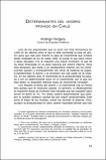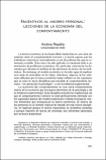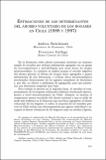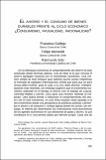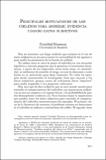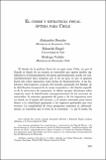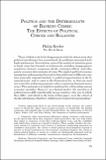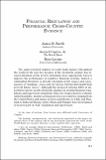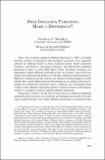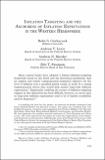Search
Now showing items 1-10 of 162
Determinantes del ahorro privado en Chile
Uno de los argumentos que se oyen con más frecuencia en Chile en los últimos años es que se debe aumentar la tasa de ahorro para que este país retome la tasa de crecimiento que exhibió desde mediados de los 80 hasta 1998. El punto es que para crecer a tasas elevadas (7%) se requiere una mayor inversión, ...
Incentivos al ahorro personal: lecciones de la economía del comportamiento
La teoría económica se ha desarrollado basándose en una serie de axiomas sobre el comportamiento humano. La teoría supone que los individuos maximizan racionalmente un set de preferencias que es coherente y estable. Este marco ha sido aplicado con bastante éxito a un sinnúmero de problemas económicos. ...
Estimaciones de los determinantes del ahorro voluntario de los hogares en Chile (1988 y 1997)
En la literatura sobre ahorro (consumo) coexisten un conjunto amplio de estudios que utilizan información agregada con un grupo de investigaciones y metodologías que usan datos de origen microeconómico. Lo anterior se explica porque el estudio empírico del ahorro plantea el dilema de ocupar datos ...
El ahorro y el consumo de bienes durables frente al ciclo económico ¿consumismo, frugalidad, racionalidad?
En la literatura económica el comportamiento del ahorro ha sido analizado desde diversas ópticas. Una de ellas es la que vincula el ahorro agregado nacional con el crecimiento económico. Una versión simple de este enfoque (que además asume acceso imperfecto al mercado de capitales internacional) señala ...
Principales motivaciones de los chilenos para ahorrar: evidencia usando datos subjetivos
Hay en economía una larga tradición que consiste en el uso de datos subjetivos ya sea para testear la racionalidad de los agentes o para medir los parámetros de la función de utilidad. En ambos casos se trata de poner al individuo en una situación hipotética y hacerle preguntas que le permitan al ...
El cobre y estrategia fiscal óptima para Chile
El diseño de la política fiscal de un país como Chile, en que el Estado es dueño de un recurso no renovable que aporta medios significativos al financiamiento del gasto gubernamental, puede ser considerablemente más complejo que el de un país en que el aparato fiscal sólo cobra impuestos como forma ...
Politics and the determinants of banking crises: the effects of political checks and balances
There is likely to be little disagreement with the observation that political interference has exacerbated the problems associated with bank insolvencies. Nevertheless, most ot the analytical attention given to bank crises has focused on technocratic mistakes (inappropriate regulatory choices), exogenous ...
Financial regulation and performance: cross-country evidence
The unprecedented number of costly bank failures throughout the world in the last two decades of the twentieth century has focused attention on the need to determine more appropriate ways to improve the performance of countries financial systems. Indeed, a substantial literature is already emerging ...
Does inflation targeting make a difference?
Since New Zealand adopted inflation targeting in 1990, a steadily growing number of industrial and emerging economies have explicitly adopted an inflation target as their nominal anchor. Eight industrial countries and thirteen emerging economies had full-fledged inflation targeting in place in early ...
Inflation targeting and the anchoring of inflation expectations in the Western hemisphere
Many central banks have adopted a formal inflation-targeting framework based on the belief and the theoretical predictions that an explicit and clearly communicated numerical objective for the level of inflation over a specified period would, in itself, be a strong communication device that would help ...

